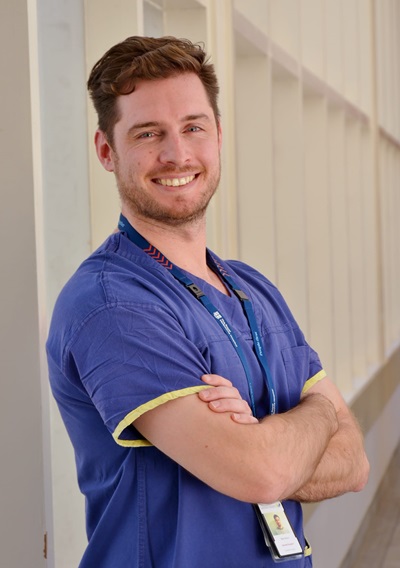2025 | Volume 26 | Issue 1

Dr Michael Bozin
Receiving the 2024 Tour de Cure Cancer Research Scholarship from the Royal Australasian College of Surgeons (RACS) has accelerated Dr Michael Bozin’s research into fluorescence and molecular-guided surgery for oesophagogastric cancer.
The scholarship has provided crucial support, allowing Dr Bozin to focus fully on his work and bring promising results closer to clinical application.
Describing previous recipients as exceptional researchers, Dr Bozin says: “To be recognised at that level is truly humbling. This acknowledgment brings a deep sense of fulfillment, affirming that I am on the right track and that my work is meaningful.”
Advancing fluorescence and molecular-guided surgery
Dr Bozin’s research at the Peter MacCallum Cancer Centre in Melbourne is now in its final stage. Promising pre-clinical results demonstrate the ability to target cancer and metastases using tumour-specific fluorescent probes.
Dr Bozin says: “The use of indocyanine green (ICG) and tumour-specific fluorescent probes have the potential to improve patient outcomes by enhancing tumour margin detection, identifying lymph node metastases and reducing the radicality of surgery.
“These advancements aim to elevate surgical quality, potentially improving quality of life outcomes and survival rates in oesophagogastric cancer patients.”
By integrating this technology into robotic and laparoscopic procedures, Dr Bozin believes his work will further enhance surgical precision.
This research is now moving into the clinical trial phase, aiming to further improve the surgical detection of tumour margins and lymph node metastases.
Raising awareness and expanding research
In 2024, Dr Bozin presented his research at national and international forums, including the Asia-Pacific Gastric Cancer Conference in Singapore and the 20th ISDE World Congress for Esophageal Diseases in Edinburgh. These platforms provided him with an opportunity to showcase his advancements to a global audience of upper gastro-intestinal (GI) surgeons, contributing to the broader understanding of fluorescence-guided surgery.
His efforts have also focused on raising awareness about improving surgical techniques for cancers with poor survival rates, such as oesophagogastric cancer.
“There are opportunities to expand this research into other areas,” Dr Bozin says. “One area we’ve been exploring is Barrett’s oesophagus, a pre-cancerous condition that can develop into oesophageal cancer. Through collaboration with hospitals like St. Vincent's in Melbourne, we’re gathering early pre-clinical data on how molecular targeting probes can be used to identify areas of pre-cancerous tissue. This could potentially lead to earlier detection and better management of pre-cancerous conditions.”
As research progresses, Dr Bozin hopes this work will improve the detection of oesophagogastric cancer in its early stages, thereby permitting less invasive treatments.
Dr Bozin’s surgical journey
Dr Bozin’s journey in medicine began when he graduated from the University of Notre Dame in 2011. He pursued his internship at the Royal Melbourne Hospital in 2012, where he continued his surgical training.
“I chose General Surgery as my specialty because I enjoyed the breadth of experiences it offers, along with the intellectual challenges it presents.”
Throughout his training, Dr Bozin maintained a strong interest in research, which led him to complete his master's degree in surgery at the University of Melbourne. His focus then shifted to oesophagogastric surgery under the mentorship of his current PhD supervisor.
What the RACS scholarship means
“The scholarship supported the pre-clinical data that now backs an upcoming clinical trial, and it provided financial stability, allowing me to commit 100 per cent of my time to my PhD in 2024,” he says.
Dr Bozin encourages other surgeons interested in research to consider applying for RACS scholarships.
“The application process was rewarding, offering an opportunity to refine my research focus and engage with like-minded professionals. The scholarship is not just about funding, it's about fostering innovation, supporting the scientific community, and providing a platform for transformative research.”
Balancing work and family
Despite his intensive research commitments, Dr Bozin prioritises family time with his wife and two-year-old son. He also enjoys playing golf when time allows.
“I’ll be returning to full-time work in February once I’ve finished my PhD,” he says.
RACS Scholarships and Grants Program is offering Research Scholarships and Learning and Development Grants for 2026. Applications open 3 March and close 14 April 2025.